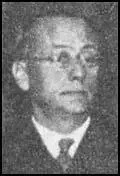José Giral

José Giral was born in Spain in 1880. He became professor of chemistry and was a leading figure in the Republican Union Party. In 1931 he was appointed as Minister of the Navy.
On 15th January 1936, Manuel Azaña helped to establish a coalition of parties on the political left to fight the national elections due to take place the following month. This included the Socialist Party (PSOE), Communist Party (PCE), Esquerra Party and the Republican Union Party.
The Popular Front, as the coalition became known, advocated the restoration of Catalan autonomy, amnesty for political prisoners, agrarian reform, an end to political blacklists and the payment of damages for property owners who suffered during the revolt of 1934. The Anarchists refused to support the coalition and instead urged people not to vote.
Right-wing groups in Spain formed the National Front. This included the CEDA and the Carlists. The Falange Española did not officially join but most of its members supported the aims of the National Front.
The Spanish people voted on Sunday, 16th February, 1936. Out of a possible 13.5 million voters, over 9,870,000 participated in the 1936 General Election. 4,654,116 people (34.3) voted for the Popular Front, whereas the National Front obtained 4,503,505 (33.2) and the centre parties got 526,615 (5.4). The Popular Front, with 263 seats out of the 473 in the Cortes formed the new government.
The Popular Front government immediately upset the conservatives by realizing all left-wing political prisoners. The government also introduced agrarian reforms that penalized the landed aristocracy. Other measures included transferring right-wing military leaders such as Francisco Franco to posts outside Spain, outlawing the Falange Española and granting Catalonia political and administrative autonomy.
As a result of these measures the wealthy took vast sums of capital out of the country. This created an economic crisis and the value of the peseta declined which damaged trade and tourism. With prices rising workers demanded higher wages. This led to a series of strikes in Spain.
On the 10th May 1936 the conservative Niceto Alcala Zamora was ousted as president and replaced by the left-wing Manuel Azaña. Soon afterwards Spanish Army officers, including Emilio Mola, Francisco Franco, Gonzalo Queipo de Llano and José Sanjurjo, began plotting to overthrow the Popular Front government. This resulted in the outbreak of the Spanish Civil War on 17th July, 1936.
President Manuel Azaña appointed Diego Martinez Barrio as prime minister on 18th July 1936 and asked him to negotiate with the rebels. He contacted Emilio Mola and offered him the post of Minister of War in his government. He refused and when Azaña realized that the Nationalists were unwilling to compromise, he sacked Martinez Barrio and replaced him with Giral. To protect the Popular Front government, Giral gave orders for arms to be distributed to left-wing organizations that opposed the military uprising.
Members of the Socialist Party were unhappy with the appointment of Giral as they considered him not radical enough to lead the Popular Front government during a civil war. Unable to rally enough political support Giral resigned on 4th September and was replaced by Francisco Largo Caballero. Giral continued in the government as minister without portfolio.
When Juan Negrin became prime minister he appointed Giral as his minister of foreign affairs. In this post he concentrated on obtaining aid from the Soviet Union.
Giral was forced to flee from Spain when General Francisco Franco and the Nationalist Army took control of the country in March 1939.
José Giral died in 1962.

